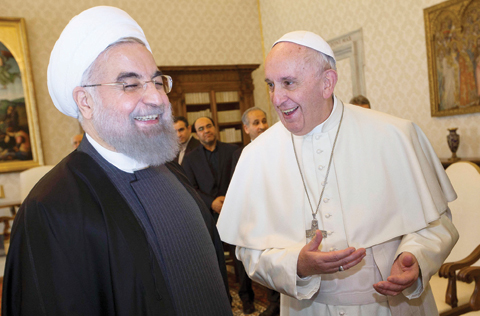 VATICAN CITY: Pope Francis (right) smiles with Iranian President Hassan Rouhani at the end of their private audience yesterday, at the Vatican. — AFP
VATICAN CITY: Pope Francis (right) smiles with Iranian President Hassan Rouhani at the end of their private audience yesterday, at the Vatican. — AFPVATICAN: Iran's president asked Pope Francis to pray for him yesterday after the two men held private talks at the Vatican, part of an Iranian effort to take a more prominent place on the world stage after a nuclear deal with Western powers. Hassan Rouhani's visit to the Holy See saw the first meeting between a pope and an Iranian president since 1999. Iran, which agreed to limit its nuclear activities in exchange for an end to economic sanctions, is eager to carve out a bigger role in mediating Middle East conflicts. Francis' papacy has been marked by mediation and conflict resolution.
The Iranian leader is on a four-day European swing to boost Iran's image abroad as well as to rehabilitate economic ties with a continent that had been a big trade partner before sanctions. "I ask you to pray for me," Rouhani told Francis after their 40-minute meeting. He called the visit by the leader of a Muslim country to the head of the Roman Catholic Church "a real pleasure." Francis thanked Rouhani for the visit and added: "I hope for peace." He gave the Iranian a medal depicting St Martin helping a poor man, an act Francis called "a sign of unsolicited brotherhood."
Rouhani brought a gift of a hand-made rug. He told the pope the red-toned carpet was made in the Iranian holy city of Qhom. Rouhani arrived for the late-morning, closed-door meeting in a motorcade of some two dozen limousines. Security, already tight around the Vatican following the Nov. 13 attacks in Paris, was even more rigid than usual. Police kept tourists and Romans from walking too close to the colonnade ringing the square before and during the visit. In his nearly three years as pope, Francis has stressed mediation as the best way to solve conflicts. He played a key role in helping Cuba and the United States to normalize their relations after decades of strict embargo.
Safest country
Rouhani yesterday described Iran as the safest and most stable country in the Middle East as he urged international investors to help modernize the country's sanctions-hit economy. On the second day of a landmark visit to Europe, the Iranian leader also pitched the Islamic Republic's potential for companies seeking a base in a region of 300 million people and vowed the government would never interfere in private business deals.
"Iran is the safest, the most stable country in the entire region," Rouhani told an audience of Italian and Iranian business executives on his first overseas trip since the lifting of sanctions linked to Tehran's nuclear program."Everyone understood that the nuclear negotiations represented a win-win situation for both sides," Rouhani said. "Now we have created the conditions for investment and for the transfer of know-how. There has to be an advantage for both sides: we invite you to invest and we will provide stability and ensure that you can make adequate returns."
Rouhani emphasized that all sections of Iran's often-divided political class were firmly behind the post-sanctions drive to secure the trade and investment needed to create new roads, rail links, airports and other infrastructure. The vision was to transform Iran into a hub for intra-regional economic development, linking the Middle East to South Asia and even the Western fringes of China. "Do not regard us as just one country but as a country at the centre of a much larger market," Rouhani said, citing the example of the port of Chabahar on Iran's southern coast. Iran is seeking international investment to help complete a port which will provide a gateway for Indian companies seeking to do business in Afghanistan and Central Asia, as well as in Iran.
Queue forming in Iran
He vowed Tehran would do nothing to jeopordise its stability and said economic growth could help beat terrorism in the region."We have no intention of attacking or invading any other country. We have no intention of interfering in the affairs of any other country. "A lack of development creates the conditions for extremism, unemployment recruits soldiers for terrorism," he argued. Italy was Iran's largest European trade partner before the impact of sanctions shrunk annual exchanges from over seven billion euros ($7.58 billion) to 1.6 billion last year.
Italian companies are now scrambling to get back into the country. They have got off to a strong start with some 17 billion euros worth of contracts signed on the first day of Rouhani's visit on Monday. Riccardo Monti, the president of the Italian Trade Agency, warned that business leaders could not afford to be complacent."This country has an enormous need of investment, expertise and a great desire for Italy," he said.
"If an Iranian entrepreneur has a choice, he chooses to do business with Italians. But there is a queue forming in Iran. We have a little advantage at the moment and we have to make the most of it." Moshen Jalapour, the president of Iran's Chamber of Commerce, said Monday's deals were only a first step and urged Western companies to start sending more specialist trade delegations to Tehran. - Agencies










